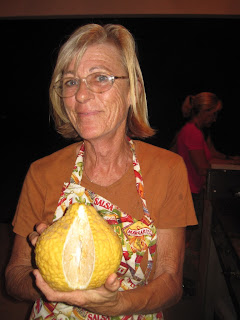On April 3rd on a bright early 08:00 Sunday morning, we left El Salvador to explore the surrounding countryside via land travel. After riding on the traditional crowded chicken bus, a short taxi ride, a fancier comfortable "Tica" bus, and a longer 1-hour taxi ride, we finally arrived at our destination of Antigua in the northern neighbouring country of Guatemala.
Antigua is a beautiful 1500s colonial town of all cobblestone streets and a population of 40,000 where all new additions or development must conform to the colonial atmosphere. (The large international Tica buses travel to/from Tapachula Mexico and throughout Central America.)
We stayed at Posada San Pedro, a former hacienda that had been converted to a fabulous boutique hotel with a tranquil inner courtyard and a kitchen that we could use if we wished.
Impressive courtyard of Posada San Pedro
After checking in, we went outside to see a procession of people dressed in vibrant purple robes coming down the cobblestone road. Easter is a highly important celebration in Mexico and Central America and the Sunday evening processions are part of the celebration events. This cobblestone road had been lined with "alfombras", very large decorative rectangles of hand-laid reeds, grains, flower petals, coloured sawdust, etc. to create religious pictures. I wanted to take a photo or two of them as they were so beautifully made but the procession was almost upon us. Then we watched as the entire procession trampled over top of the street carpets (carrying their heavy floats with statues of Jesus and the Holy Virgin of Sorrow) and totally destroying them all!
The next morning we strolled around Antigua and visited the Museo (museum) which housed fabulous weavings from all around Guatemala, including several types that were hand-stitched.
Weavings that are so very intricate
The indigenous dress of the locals was very evident in Antigua. If you are familiar with the types of weaving and patterns from the surrounding areas, you can tell by observing the women's colourful and exotic skirts which area of country they are from.
Taking a break from selling the wares in their woven bags and on their heads!
Next we wandered through the artisan mercado where we saw more outstanding weavings, jade and volcanic rock jewellery, traditional Mayan blouses and handbags, and so much more. Through one of the many travel agencies that dot the streets we booked a tour to the famous Copán ruins, just over the border in Honduras. The ruins in Tikal are more well-known but farther away so we will visit them when we are sailing the eastern coast of Honduras in the later years of our travels. As it is, it's a 6-hour ride from Antigua in Guatemala to Copán in Honduras.
The van picked us up at our hotel at 04:00 (yes, that's 4:00 in the morning) so we would arrive at Copán by 10:00 and not waste away half the day travelling. After a 15-minute walk from our hotel, we spent the day wandering around the vast ruins with a guide well-versed in English and all of the archaeological history of the ruins which was fascinating.
Detailed original statue that's still standing
More original features
The next morning, we walked back to the ruins and toured the museum where on display were several original intact sculptures and partial reconstructions using excavated facades. One displayed structure was a replica of an intact yet buried structure that was not accessible to the public (but will be in the future).
Réplica de "Rosalila"
Our 2 days in Copan and the ride back to Antigua was in the enjoyable company of a young couple we met from France. We then took in more sights around Antigua for another couple of days before the long journey back to El Salvador.
Guatemala, Honduras, and El Salvador are obviously not yet environmentally conscious where garbage litters many streets and highways. Perhaps an effort is starting to be made as we noticed garbage cans in Antigua that have a statement on them about protecting the environment, so hopefully in the future, clean-ups will be evident.
The large cities of San Salvador and especially Guatemala City are foreboding places. While travelling through, scenes of barbed wire topped walls, barred windows and entrances everywhere, and the ever present armed security guards speak clearly that you wouldn't venture out alone especially at night in most areas.
Tuk tuks (3-wheeled motorized rickshaws) are everywhere in Guatemala and Honduras but we were close enough to everything to walk. So far, we've only used them once when in Herradura, El Salvador.


























